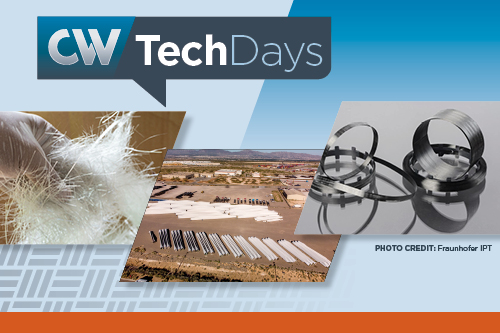Composites Use in Automotive
Composites are used frequently in motorsports and lower volume, high-end/luxury vehicles, which typically favor continuous carbon fiber materials. They are also often used to fabricate exterior structures in racing vehicles, where their relative light weight provides speed and performance advantages over metals. Within mid- and high-volume production vehicles, common composite applications include glass fiber-reinforced polymer (GFRP) leaf springs, suspension components, and drive shafts, sheet molding compound (SMC) body panels and frames; bulk molding compound (BMC) housings and support structures; and injection-molded thermoplastics for bumper frames, lift gates and seat structures.

Latest Automotive Articles
VIEW ALLFour Syensqo innovations are recognized at 2025 SPE Automotive Awards
Syensqo’s fiber-reinforced polymers, specialty compounds and bio-based PPA materials earn automotive impact distinction.
Read MoreElectromagnetically transparent GFRP rotor for rare earth magnet-free electric motors
A research consortium within the Baden-Württemberg’s ICM research cluster has created a prototype GFRP wireless power transfer electric motor rotor.
Read MoreHTMS engineers raise £1.3 million to enable mass-market CMC availability
Company founders will be opening a new production facility and office to support HTMS’ ongoing materials R&D and collaborations in new sectors like automotive.
Read MoreSiemens, Ducati extend partnership to advance innovation
Siemens Xcelerator Platform helps extend racing innovation to production bikes, reduces time for complex composite parts and enables remote design/3D printing at track, digital twin and faster development.
WatchPost Cure: NFPA-rated carbon fiber composite fire truck pump for firefighting, energy industries
Direct engine-driven systems or firetruck applications benefit from the lightweight, compact, high-volume centrifugal pump by KASE Pumping Systems.
Read MoreSGL Carbon and Carbon Cleanup form autocomposite recycling partnership
An AI-supported collection system, recycling program and CARB-E tech, already demonstrating CO2 part reduction in early automotive applications, are building recycling scalability.
Read MoreKnowledge Centers

This CW Tech Days event will explore the technologies, materials, and strategies that can help composites manufacturers become more sustainable.
LEARN MORE
ÂÌñÏ×ÆÞ’s CW Tech Days: Infrastructure event offers a series of expert presentations on composite materials, processes and applications that should and will be considered for use in the infrastructure and construction markets.
LEARN MORELatest Automotive News And Updates
Dymag reveals Halo X-track-approved wheels for Porsche GT3 RS
Exclusive for Porsche, but with additional applications under development, the carbon fiber composite Halo wheel is certified for road-legal track cars.
Read MoreAltair 2025 Enlighten Award winners, runner-ups push automotive boundaries
Hemp nylon-reinforced PA6 automotive exteriors, TPC acoustic elements, glass fiber stator cooling design and other innovations are recognized for their sustainability focus, holistic capabilities and lightweight designs.
Read MoreNatural fibers power Cupra’s vision for sustainable mobility
Cupra’s latest concept vehicle, Tindaya, demonstrates Bcomp ampliTex through both visible interior and semi-structural parts.
Read MoreBrembo SGL Carbon Ceramic Brakes expands disc production capacity by 50%
The 50/50 joint venture adds a combined 12,500 square meters of space at Italy and Germany sites, future-proofing carbon-ceramic disc production for premium cars, commercial vehicles.
Read MoreSABIC composite hybrid battery cover enhances EV safety, efficiency
SABIC collaborated with Engel, Siebenwurst, Forward Engineering, Ensinger and Envalior to develop a thermoplastic composite EV battery cover, combining strong structural performance, flame retardancy and design efficiency.
Read MoreAM Group adds carbon fiber composites capabilities via UBC Composites
The purchase of composite parts, model and toolmaking specialist UBC Composites will expand AM Group’s high-end automotive offerings, and give new opportunities in other demanding industries.
Read MoreFeatured Posts
Industrializing rapid tape shearing for high-rate, 3D composite structures
ICOMAT’s first RTS factory creates preforms in 5 minutes for parts with -65% weight, higher strength and damage tolerance for wingskins, spars, fuselage, space tanks, auto chassis and more.
Read MoreModular approach to material card development of composites
Forward Engineering GmbH walks through a modular testing and simulation approach for automotive/aviation composites enabling more accurate material selection earlier in the design phase.
Read MoreNational Composites Week 2025: Transportation
Commemorating the theme “Performance With Purpose,” CW has gathered key stories over the last year that exemplify how composites have progressed commercial automotive and mass transit.
Read MoreComposites end markets: Automotive (2025)
Composites manufacturing intelligence drives circular economy solutions as automotive industry balances technical demands with sustainability mandates.
Read MoreInfused sandwich window frame components help double-decker buses meet weight targets
Prototype GFRP parts were evaluated by Spanish bus manufacturer Carrocerías Ayats as an initial move toward lighter, more efficient, more automated parts and processes.
Read MoreBucci Composites expands automotive production capabilities with facility addition, new high-ton presses
CW Top Shops recipient Bucci Composites shares an update on its facility expansion, automotive composites applications, sustainability, education initiatives and more.
Read MoreFAQ: Automotive
How are composites used in automotive structures?
Within mid- and high-volume production vehicles, common composite applications include glass fiber-reinforced polymer (GFRP) leaf springs, suspension components, and drive shafts, sheet molding compound (SMC) body panels and frames; bulk molding compound (BMC) housings and support structures; and injection-molded thermoplastics for bumper frames, lift gates and seat structures.
As electric vehicles (EV) become more prevalent on the road and in development by automotive manufacturers, new opportunities exist for composites and composite materials development. For example, a lighter-weight, composites-intensive vehicle is likely capable of driving for a longer range between charges. Battery enclosures present one large market opportunity in the EV market.
Why use composites for electric vehicle (EV) battery enclosures?
As the automotive industry rapidly electrifies its fleets, interest is growing among OEMs and battery module producers in using composite materials for battery enclosures — covers and trays that hold and protect the frames and battery cells themselves.
There are many reasons for this, including the ability to reduce mass and stack tolerances, the fact that battery enclosures are multicomponent assemblies and poor impact performance of metals. In each of these areas, composite battery enclosures offer quantifiable benefits versus metals: lower mass, higher design freedom with greater space efficiency, faster assembly, no corrosion, greater durability and — with specific formulations — better flame resistance/fire containment.
Source: Price, performance, protection: EV battery enclosures, Part 1


















